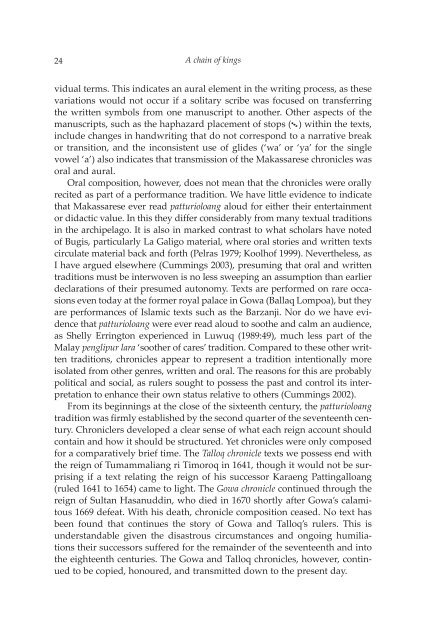A CHAIN OF KINGS - Books and Journals
A CHAIN OF KINGS - Books and Journals
A CHAIN OF KINGS - Books and Journals
You also want an ePaper? Increase the reach of your titles
YUMPU automatically turns print PDFs into web optimized ePapers that Google loves.
24<br />
A chain of kings<br />
vidual terms. This indicates an aural element in the writing process, as these<br />
variations would not occur if a solitary scribe was focused on transferring<br />
the written symbols from one manuscript to another. Other aspects of the<br />
manuscripts, such as the haphazard placement of stops (.) within the texts,<br />
include changes in h<strong>and</strong>writing that do not correspond to a narrative break<br />
or transition, <strong>and</strong> the inconsistent use of glides (‘wa’ or ‘ya’ for the single<br />
vowel ‘a’) also indicates that transmission of the Makassarese chronicles was<br />
oral <strong>and</strong> aural.<br />
Oral composition, however, does not mean that the chronicles were orally<br />
recited as part of a performance tradition. We have little evidence to indicate<br />
that Makassarese ever read patturioloang aloud for either their entertainment<br />
or didactic value. In this they differ considerably from many textual traditions<br />
in the archipelago. It is also in marked contrast to what scholars have noted<br />
of Bugis, particularly La Galigo material, where oral stories <strong>and</strong> written texts<br />
circulate material back <strong>and</strong> forth (Pelras 1979; Koolhof 1999). Nevertheless, as<br />
I have argued elsewhere (Cummings 2003), presuming that oral <strong>and</strong> written<br />
traditions must be interwoven is no less sweeping an assumption than earlier<br />
declarations of their presumed autonomy. Texts are performed on rare occasions<br />
even today at the former royal palace in Gowa (Ballaq Lompoa), but they<br />
are performances of Islamic texts such as the Barzanji. Nor do we have evidence<br />
that patturioloang were ever read aloud to soothe <strong>and</strong> calm an audience,<br />
as Shelly Errington experienced in Luwuq (1989:49), much less part of the<br />
Malay penglipur lara ‘soother of cares’ tradition. Compared to these other written<br />
traditions, chronicles appear to represent a tradition intentionally more<br />
isolated from other genres, written <strong>and</strong> oral. The reasons for this are probably<br />
political <strong>and</strong> social, as rulers sought to possess the past <strong>and</strong> control its interpretation<br />
to enhance their own status relative to others (Cummings 2002).<br />
From its beginnings at the close of the sixteenth century, the patturioloang<br />
tradition was firmly established by the second quarter of the seventeenth century.<br />
Chroniclers developed a clear sense of what each reign account should<br />
contain <strong>and</strong> how it should be structured. Yet chronicles were only composed<br />
for a comparatively brief time. The Talloq chronicle texts we possess end with<br />
the reign of Tumammaliang ri Timoroq in 1641, though it would not be surprising<br />
if a text relating the reign of his successor Karaeng Pattingalloang<br />
(ruled 1641 to 1654) came to light. The Gowa chronicle continued through the<br />
reign of Sultan Hasanuddin, who died in 1670 shortly after Gowa’s calamitous<br />
1669 defeat. With his death, chronicle composition ceased. No text has<br />
been found that continues the story of Gowa <strong>and</strong> Talloq’s rulers. This is<br />
underst<strong>and</strong>able given the disastrous circumstances <strong>and</strong> ongoing humiliations<br />
their successors suffered for the remainder of the seventeenth <strong>and</strong> into<br />
the eighteenth centuries. The Gowa <strong>and</strong> Talloq chronicles, however, continued<br />
to be copied, honoured, <strong>and</strong> transmitted down to the present day.









![Am HaSefer [Volk des Buches] - Books and Journals](https://img.yumpu.com/20648352/1/174x260/am-hasefer-volk-des-buches-books-and-journals.jpg?quality=85)







